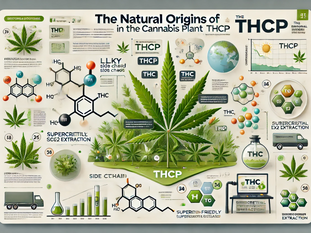
Understanding the Spectrum of Cannabinoids: From THCP to CBD, THC, CBN, CBG, Delta 8 THC, and Delta 9 THC
Mar 10
3 min read
0
1
0

Understanding the Spectrum of Cannabinoids: From THCP to CBD, THC, CBN, CBG, Delta 8 THC, and Delta 9 THC
Cannabis contains a complex array of cannabinoids, each offering unique effects and benefits. This article delves into one of the newer and intriguing cannabinoids, tetrahydrocannabiphorol (THCP), and compares it to well-known cannabinoids like CBD, THC, CBN, CBG, Delta 8 THC, and Delta 9 THC. Discover the distinctive properties of these compounds and their potential applications.
What is THCP?
THCP is a potent cannabinoid similar to THC but is up to 30 times stronger, according to recent studies. It binds more efficiently to the body’s cannabinoid receptors, potentially leading to more pronounced effects. This makes THCP a subject of interest for both medical research and recreational use. Imagine a regular espresso shot, now imagine it supercharged; that's THCP in the cannabinoid world!
Comparing Key Cannabinoids: THCP, CBD, THC, CBN, CBG, Delta 8, and Delta 9
CBD (Cannabidiol): CBD is renowned for its therapeutic benefits without psychoactive effects. It's used widely for reducing anxiety, managing pain, and improving sleep. For those seeking relief without a high, CBD is an excellent choice.
THC (Tetrahydrocannabinol): THC is the primary psychoactive component in cannabis, responsible for the "high" sensation. Delta 9 THC is the most prevalent form, known for its strong psychoactive effects and is the centerpiece of most cannabis legislation.
CBN (Cannabinol): CBN is known as the "sleepy" cannabinoid, ideal for those battling insomnia. It forms as THC ages and has a milder psychoactive profile, making it less about the high and more about relaxation.
CBG (Cannabigerol): CBG is considered the "mother of all cannabinoids" because it acts as a precursor to many others. Non-psychoactive and less prevalent, CBG is studied for its anti-inflammatory and antibacterial properties.
Delta 8 THC: Delta 8 THC offers a lighter, more stable high compared to Delta 9 THC. It's often chosen for its less intense but still psychoactive effects, providing a smoother experience for users looking for a mild high.
Delta 9 THC: The most well-known and potent form of THC, Delta 9 THC is the classic compound associated with cannabis' psychoactive effects. It’s the focus of both medicinal studies and recreational use.
Exploring Cannabinoid Effects
My own exploration into cannabinoids started with a mild Delta 8 THC gummy, which provided a pleasant, manageable high—perfect for a relaxed evening. This contrasted sharply with a more potent Delta 9 THC experience, which was overwhelmingly intense for a casual setting. Such personal trials have shown me the importance of dosage and the distinct effects of each cannabinoid.
Why Cannabinoid Differences Are Crucial
For both recreational users and medical cannabis patients, understanding the specific effects of each cannabinoid can guide better choices for their needs. Whether seeking relief from chronic pain without intoxication or exploring potent recreational options, there's a cannabinoid that fits the bill.
Legal Considerations for Cannabinoids
Navigating the legal landscape of cannabinoids is crucial. While CBD is widely legal, THC variants often come with more stringent regulations. THCP’s legal status remains uncertain, as it could be classified under analog laws in some regions.
Conclusion: Tailoring Your Cannabis Experience
Each cannabinoid offers a unique profile, from the calming effects of CBD and CBN to the intense high of THCP and Delta 9 THC. Understanding these differences helps users tailor their cannabis experience to their needs, whether for health benefits or recreational purposes. Always start with a low dose, especially with potent cannabinoids, and stay informed about the legal status of these compounds in your area.
By exploring the distinct properties of cannabinoids like THCP, CBD, and Delta 9 THC, users can maximize the benefits of cannabis in a safe and informed manner.




